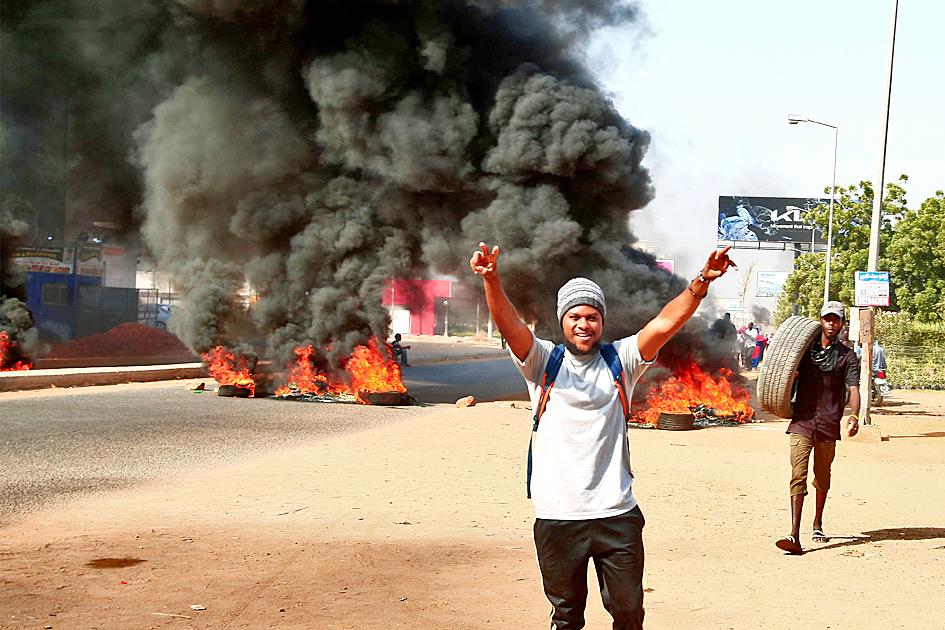Sudan’s top general yesterday declared a state of emergency, dissolved the authorities leading the nation’s democratic transition and announced the formation of a new government after troops detained civilian leaders in what democracy advocates denounced as a “coup.”
General Abdel Fattah al-Burhan’s announcement in a televised address came after armed forces detained government officials in charge of leading the transition to democracy since the April 2019 ouster of former Sudanese president Omar al-Bashir.
“To rectify the revolution’s course, we have decided to declare a state of emergency nationwide ... dissolve the transitional sovereign council and dissolve the Cabinet,” al-Burhan said.

Photo: AFP
His statement came as clashes erupted in the capital, Khartoum, with troops firing live rounds at people who took to the streets to protest against the power grab.
The violence was largely centered outside the army headquarters hours after troops detained Sudanese Prime Minister Abdalla Hamdok, ministers and civilian members of the ruling council, the Sudanese Ministry of Information said.
They were taken away after “refusing to support the coup,” the ministry wrote on Facebook.
Internet services were cut across the nation at about dawn, and the main roads and bridges into Khartoum shut, before troops stormed the headquarters of Sudan’s state broadcaster in the capital’s twin city of Omdurman, the ministry said.
People took to the streets soon after, setting tires ablaze and piling rows of bricks across roads to block them in protest against the move, a correspondent reported.
“Military forces have fired live bullets on protesters rejecting the military coup outside the army headquarters,” the ministry said.
About a dozen people had been wounded in the clashes, according to the Central Committee of Sudan Doctors, an independent medical union.
The power grab, which came after weeks of tension between the military and civilian officials sharing power since al-Bashir’s ouster, was condemned by the international community.
The EU called for the release of the civilian leadership and said “violence and bloodshed must be avoided.”
“The EU is very concerned about Sudan’s military forces reportedly putting prime minister Hamdok under house arrest, as well as detaining other members of the civilian leadership, and we urge for their fast release,” European Commission spokeswoman Nabila Massrali said.
US Special Envoy for the Horn of Africa Jeffrey Feltman said: “The US is deeply alarmed at reports of a military takeover of the transitional government.”
“Any changes to the transitional government by force puts at risk US assistance,” Feltman wrote on Twitter.
The UN described the detentions as “unacceptable.”
“I call on the security forces to immediately release those who have been unlawfully detained or placed under house arrest,” UN Special Representative to Sudan Volker Perthes said.
Al-Bashir, who ruled Sudan with an iron fist for three decades, is in Khartoum’s high-security Kober Prison. He is wanted by the International Criminal Court over charges of genocide, war crimes and crimes against humanity in Sudan’s Darfur region.

CARROT AND STICK: While unrelenting in its military threats, China attracted nearly 40,000 Taiwanese to over 400 business events last year Nearly 40,000 Taiwanese last year joined industry events in China, such as conferences and trade fairs, supported by the Chinese government, a study showed yesterday, as Beijing ramps up a charm offensive toward Taipei alongside military pressure. China has long taken a carrot-and-stick approach to Taiwan, threatening it with the prospect of military action while reaching out to those it believes are amenable to Beijing’s point of view. Taiwanese security officials are wary of what they see as Beijing’s influence campaigns to sway public opinion after Taipei and Beijing gradually resumed travel links halted by the COVID-19 pandemic, but the scale of

TRADE: A mandatory declaration of origin for manufactured goods bound for the US is to take effect on May 7 to block China from exploiting Taiwan’s trade channels All products manufactured in Taiwan and exported to the US must include a signed declaration of origin starting on May 7, the Bureau of Foreign Trade announced yesterday. US President Donald Trump on April 2 imposed a 32 percent tariff on imports from Taiwan, but one week later announced a 90-day pause on its implementation. However, a universal 10 percent tariff was immediately applied to most imports from around the world. On April 12, the Trump administration further exempted computers, smartphones and semiconductors from the new tariffs. In response, President William Lai’s (賴清德) administration has introduced a series of countermeasures to support affected

Pope Francis is be laid to rest on Saturday after lying in state for three days in St Peter’s Basilica, where the faithful are expected to flock to pay their respects to history’s first Latin American pontiff. The cardinals met yesterday in the Vatican’s synod hall to chart the next steps before a conclave begins to choose Francis’ successor, as condolences poured in from around the world. According to current norms, the conclave must begin between May 5 and 10. The cardinals set the funeral for Saturday at 10am in St Peter’s Square, to be celebrated by the dean of the College

CROSS-STRAIT: The vast majority of Taiwanese support maintaining the ‘status quo,’ while concern is rising about Beijing’s influence operations More than eight out of 10 Taiwanese reject Beijing’s “one country, two systems” framework for cross-strait relations, according to a survey released by the Mainland Affairs Council (MAC) on Thursday. The MAC’s latest quarterly survey found that 84.4 percent of respondents opposed Beijing’s “one country, two systems” formula for handling cross-strait relations — a figure consistent with past polling. Over the past three years, opposition to the framework has remained high, ranging from a low of 83.6 percent in April 2023 to a peak of 89.6 percent in April last year. In the most recent poll, 82.5 percent also rejected China’s